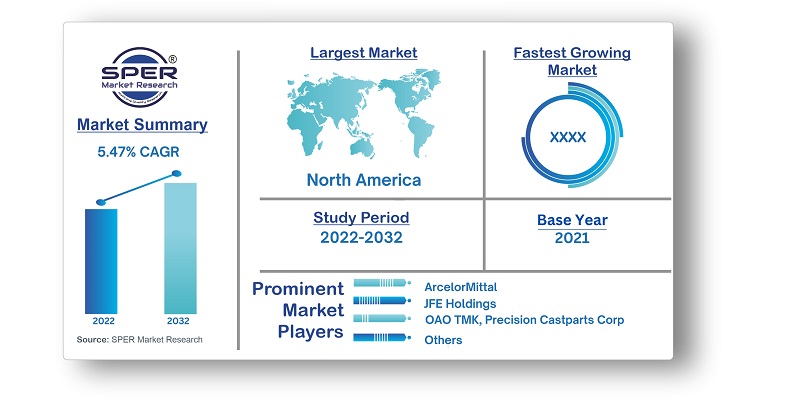
Seamless Pipes Market Growth, Size, Trends, Demand, Share, Revenue and Future Competition
Seamless Pipes Market Size- By Type, By Material, By Production Process, By End User- Regional Outlook, Competitive Strategies and Segment Forecast to 2032
| Published: Feb-2023 | Report ID: CHEM2321 | Pages: 1 - 211 | Formats*: |
| Category : Chemical & Materials | |||

-006115328092023.jpg)
| Report Metric | Details |
| Market size available for years | 2019-2032 |
| Base year considered | 2021 |
| Forecast period | 2022-2032 |
| Segments covered | By Type, By Material, By Production Process, By End User |
| Regions covered | North America, Europe, Asia Pacific, South America, Middle East and Africa |
| Companies Covered | ArcelorMittal, JFE Holdings, Inc., Jindal SAW Ltd, NIPPON STEEL CORPORATION, OAO TMK, Precision Castparts Corp., Salzgitter AG, Sandvik AB, Seeberger GmbH & Co. KG, Shalco Industries Pvt. Ltd., Tenaris, TPCO Enterprise, Inc., United Seamless Tubulaar Pvt. Ltd., United States Steel Corporation, VALLOUREC, ZAFFERTEC, Zekelman Industries, Others |
- Aerospace Industry
- Automotive Industry
- Automotive manufacturing companies
- Construction Industry
- Mining companies
- Oil and Gas Industry
- Pipeline construction companies
- Power generation companies
- Others
| By Type: |
|
| By Material: |
|
| By Production Process: |
|
| By End User: |
|
- Global Seamless Pipes Market Size (FY’2022-FY’2032)
- Overview of Global Seamless Pipes Market
- Segmentation of Global Seamless Pipes Market By Type (Cold Finished Seamless Pipes, Hot Finished Seamless Pipes)
- Segmentation of Global Seamless Pipes Market By Material (Aluminium & Magnesium Alloys, Copper & Alloys, Nickel & Alloys, Steel & Alloys, Others)
- Segmentation of Global Seamless Pipes Market By Production Process (Continuous Mandrel Rolling, Cross-roll Piercing & Pilger Rolling, Multi-stand Plug Mill)
- Segmentation of Global Seamless Pipes Market By End User (Automotive, Engineering, Infrastructure & Construction, Oil & Gas, Power Generation, Others)
- Statistical Snap of Global Seamless Pipes Market
- Expansion Analysis of Global Seamless Pipes Market
- Problems and Obstacles in Global Seamless Pipes Market
- Competitive Landscape in the Global Seamless Pipes Market
- Impact of COVID-19 and Demonetization on Global Seamless Pipes Market
- Details on Current Investment in Global Seamless Pipes Market
- Competitive Analysis of Global Seamless Pipes Market
- Prominent Players in the Global Seamless Pipes Market
- SWOT Analysis of Global Seamless Pipes Market
- Global Seamless Pipes Market Future Outlook and Projections (FY’2022-FY’2032)
- Recommendations from Analyst
1.1. Scope of the report1.2. Market segment analysis
2.1 Research data source2.1.1 Secondary data2.1.2 Primary data2.1.3 SPER’s internal database2.1.4 Premium insight from KOL’s2.2 Market size estimation2.2.1 Top-down and Bottom-up approach2.3 Data triangulation
4.1. Driver, Restraint, Opportunity and Challenges analysis4.1.1 Drivers4.1.2 Restraints4.1.3 Opportunities
4.1.4 Challenges
4.2. COVID-19 Impacts of the Global Seamless Pipes Market
5.1. SWOT analysis5.1.1 Strengths5.1.2 Weaknesses5.1.3 Opportunities5.1.4 Threats5.2. PESTEL analysis5.2.1 Political landscape5.2.2 Economic landscape5.2.3 Social landscape5.2.4 Technological landscape5.2.5 Environmental landscape5.2.6 Legal landscape5.3. PORTER’S five forces analysis5.3.1 Bargaining power of suppliers5.3.2 Bargaining power of Buyers5.3.3 Threat of Substitute5.3.4 Threat of new entrant5.3.5 Competitive rivalry5.4. Heat map analysis
6.1 Global Seamless Pipes Manufacturing Base Distribution, Sales Area, Product Type6.2 Mergers & Acquisitions, Partnerships, Product Launch, and Collaboration in Global Seamless Pipes Market
7.1 Cold Finished Seamless Pipes7.2 Hot Finished Seamless Pipes
8.1 Aluminium & Magnesium Alloys8.2 Copper & Alloys8.3 Nickel & Alloys8.4 Steel & Alloys8.5 Others
9.1 Continuous Mandrel Rolling9.2 Cross-roll Piercing & Pilger Rolling9.3 Multi-stand Plug Mill
10.1 Automotive10.2 Engineering10.3 Infrastructure & Construction10.4 Oil & Gas10.5 Power Generation10.6 Others
11.1 Global Seamless Pipes Market and Market Share by Region (2019-2025)11.2 Global Seamless Pipes Market and Market Share by Region (2026-2032)11.3 Asia-Pacific11.3.1 Australia11.3.2 China11.3.3 India11.3.4 Japan11.3.5 South Korea11.3.6 Rest of Asia-Pacific11.4 Europe11.4.1 France11.4.2 Germany11.4.3 Italy11.4.4 Spain11.4.5 United Kingdom11.4.6 Rest of Europe11.5 Middle East and Africa11.5.1 Kingdom of Saudi Arabia11.5.2 United Arab Emirates11.5.3 Rest of Middle East & Africa11.6 North America11.6.1 Canada11.6.2 Mexico11.6.3 United States11.7 Latin America11.7.1 Argentina11.7.2 Brazil11.7.3 Rest of Latin America
12.1 ArcelorMittal12.1.1 Company details12.1.2 Financial outlook12.1.3 Product summary12.1.4 Recent developments12.2 JFE Holdings, Inc.12.2.1 Company details12.2.2 Financial outlook12.2.3 Product summary12.2.4 Recent developments12.3 Jindal SAW Ltd12.3.1 Company details12.3.2 Financial outlook12.3.3 Product summary12.3.4 Recent developments12.4 NIPPON STEEL CORPORATION12.4.1 Company details12.4.2 Financial outlook12.4.3 Product summary12.4.4 Recent developments12.5 OAO TMK12.5.1 Company details12.5.2 Financial outlook12.5.3 Product summary12.5.4 Recent developments12.6 Precision Castparts Corp.12.6.1 Company details12.6.2 Financial outlook12.6.3 Product summary12.6.4 Recent developments12.7 Salzgitter AG12.7.1 Company details12.7.2 Financial outlook12.7.3 Product summary12.7.4 Recent developments12.8 Sandvik AB12.8.1 Company details12.8.2 Financial outlook12.8.3 Product summary12.8.4 Recent developments12.9 Seeberger GmbH & Co. KG12.9.1 Company details12.9.2 Financial outlook12.9.3 Product summary12.9.4 Recent developments12.10 Shalco Industries Pvt. Ltd.12.10.1 Company details12.10.2 Financial outlook12.10.3 Product summary12.10.4 Recent developments12.11 Tenaris12.11.1 Company details12.11.2 Financial outlook12.11.3 Product summary12.11.4 Recent developments12.12 TPCO Enterprise, Inc.12.12.1 Company details12.12.2 Financial outlook12.12.3 Product summary12.12.4 Recent developments12.13 United Seamless Tubulaar Pvt. Ltd.12.13.1 Company details12.13.2 Financial outlook12.13.3 Product summary12.13.4 Recent developments12.14 United States Steel Corporation12.14.1 Company details12.14.2 Financial outlook12.14.3 Product summary12.14.4 Recent developments12.15 VALLOUREC12.15.1 Company details12.15.2 Financial outlook12.15.3 Product summary12.15.4 Recent developments12.16 ZAFFERTEC12.16.1 Company details12.16.2 Financial outlook12.16.3 Product summary12.16.4 Recent developments12.17 Zekelman Industries12.17.1 Company details12.17.2 Financial outlook12.17.3 Product summary12.17.4 Recent developments
SPER Market Research’s methodology uses great emphasis on primary research to ensure that the market intelligence insights are up to date, reliable and accurate. Primary interviews are done with players involved in each phase of a supply chain to analyze the market forecasting. The secondary research method is used to help you fully understand how the future markets and the spending patterns look likes.
The report is based on in-depth qualitative and quantitative analysis of the Product Market. The quantitative analysis involves the application of various projection and sampling techniques. The qualitative analysis involves primary interviews, surveys, and vendor briefings. The data gathered as a result of these processes are validated through experts opinion. Our research methodology entails an ideal mixture of primary and secondary initiatives.



Frequently Asked Questions About This Report
PLACE AN ORDER
Year End Discount
Sample Report
Pre-Purchase Inquiry
NEED CUSTOMIZATION?
Request CustomizationCALL OR EMAIL US
100% Secure Payment






Related Reports
Our Global Clients
Our data-driven insights have influenced the strategy of 200+ reputed companies across the globe.






















